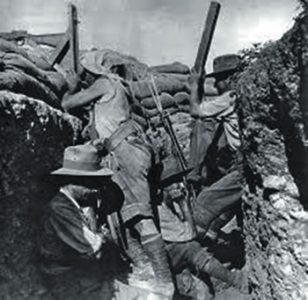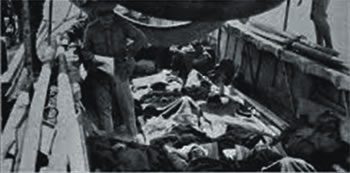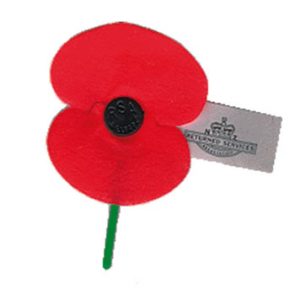Gallipoli Experience
April 25 brings with it the Centenary of the Gallipoli campaign. What follows is a commentary from Fr Dave Mullins sm on his father’s involvement in that campaign. Jack Mullins left a first-hand account of his experiences which are published in a book “Play to Win.”
The Baptism of fire.
25th April 1915
An Unvarnished Story
I have wondered how a man feels during his experience under fire for the first time, but having gone through the ordeal myself I can truthfully say that it it not so very dreadful, or rather, one does not realise the seriousness of it. But to say that one does not feel nervous at the start is a falsehood, pure and simple. It is only natural for a man to value his life very dearly. And when in the firing line, he must know that any one of the thousands of bullets that are flying about may be the cause of him losing all interest in this very enjoyable earth.
Thoughts before Battle
While we were lying at anchor previous to going into battle against the Turks, we were very anxious to get to the business right away, and this was a wish expressed by almost every man on the boat. When we awoke on that beautiful Sunday morning, and listened to the incessant rifle and machine gun fire, we felt that at last our chance had come, and before the day was out we would be able to form our own opinion of modern warfare. During our run to shore in open boats, no one would admit himself to being anything but quite cool, but when a bullet whistled down my sleeve I must say I considered the possibility of more arriving, and felt like crouching in the bottom of the boat. This feeling I quickly dismissed, but I was not sorry when I felt dry ground under my feet.
Under Fire
As soon as we arrived we noticed a number of our late confreres lying dead about the beach. And one must confess to a feeling of awe, and wondered if one would suffer the same fate.
The bursting of enemy shells did not look promising, but at this stage we were safe from harm. When we climbed the first hill, however, and got right under fire my feelings are hard to describe. Our lieutenant was just ahead of us, and in our new surroundings I felt like bolting for dear life, but somewhat unconsciously followed our leader. We advanced a little and after occupying and vacating several trenches on our way we came to still another one, and, of course, dropped into it.
The order came that we were to vacate the trench and take cover offered by a mound directly behind. We jumped out of the trench, and over it, and back again, and I am still wondering why we were not shot down while doing so, but luck was with us. Eventually we got down behind the mound, and then the bullets commenced to fly in earnest. And I can say that I did not hesitate to bury my nose in the dirt with a view of getting my head a quarter of an inch further away from the bullets. This position got all together too warm for us, and we followed our officer to another trench.
Every whistle of bullets made me duck my head and turn my coat collar up, for what reason I do not know, but many others were doing exactly the same thing. I tried not to be scared but as we advanced I still ducked my head, even though I was not nearly as frightened as I had been half an hour earlier. As we tore up the hill I was hell bent on getting to the firing line, where, I thought, for some unexplainable reason, I would be fairly safe,and so it seemed for a little while. I flopped down behind a mound and like a dozen others, lit a cigarette. I am an inveterate cigarette smoker, and maybe I did it from force of habit, but it seemed strange that in the face of murderous fire every second man was smoking.
Turks Run From the Bayonet
Soon bullets were coming thick and fast, and we did not wait to be told to keep our heads down. The Turks advanced and the order was passed along to fix bayonets. Now, I thought, I will get a real taste of it, but no sooner had the enemy seen the flash of steel than he retreated to what he thought was safer ground. As a matter of fact, if the Turks possessed more ginger to charge our position they would have wiped us out completely. As the enemy turned the order, “three rounds rapid,” was rapped out, and we were gratified to see that our shots had taken good effect. 
Soon Wounded
After this I lost interest in the scrap, for while going back for ammunition, something got me, and via various proceedings, I was taken back to the shore, and away from harm. And this is when I felt most the fear of battle, and there were hundreds in the same plight. Every shell that burst I thought would get me, and that journey of half an hour seemed like ages. The feeling that one is helpless to defend oneself causes untold anguish, even though one knows he is safer there than anywhere else. My first experience under fire gave me many new thrills and plenty of excitement, besides a good deal of fun. Now I am only waiting for the opportunity to once again join my old regiment, an opportunity that every man on board this ship is looking for.
He wrote this while being transported from the war zone to hospital in Alexandria. He must have been over-keen to return to battle, and, as the following extract tells us, he did so prematurely. He made it in time for the battle of the Dardenelles, the channel from the Mediterranean Sea to the Black Sea, and is overlooked by the Gallipoli Peninsula.
The feeling that one is helpless to defend oneself causes untold anguish
From “The Press” we read what a prominent member of the Canterbury Battalion wrote from the Gallipoli Peninsula, “One evening I ran across Jack Mullins, of the Christchurch Football Club and “The Press” staff. Laid low the first day or so, he had reached the overcrowded hospitals of Alexandria, and had returned to the fight before he was quite right. Now he was undergoing the final treatment on the Gallipoli Peninsula. With some thirty others he lay all day in the hospital marquee. (It had been shifted since to safer quarters). Then it had leant close to the bank, and the sea lapped just thirty yards in front. Just previously a shrapnel had showered its iron hail through the canvas roof. Fortunately and miraculously it wounded only one of the already wounded lying in their stretchers. It was dry, momentous and wearisome lying there all day. Papers to read would have been a godsend and smokes were non est. I collected as many papers as I could and a few smokes, and took them to Jack Mullins.---”
It was in the last week of May that he had returned to the firing line, so his hospitalisation in Alexandra was of a short duration. On the 24th May he wrote a report from his sick bay on Gallipoli Peninsula. He wrote under the name of Our special Correspondent and his press box he titled, Dug-out “De Lux.”
Yes he was at Anzac Cove on the 25th April,1915 – that dreaded day when, through the incompetence of army leaders, thousands of young lives were led to an ignominious death on the beach at Anzac Cove. (The story of this battle is well documented in New Zealand’s military history.) Jack Mullins was one of the few who survived.


 Entries(RSS)
Entries(RSS)